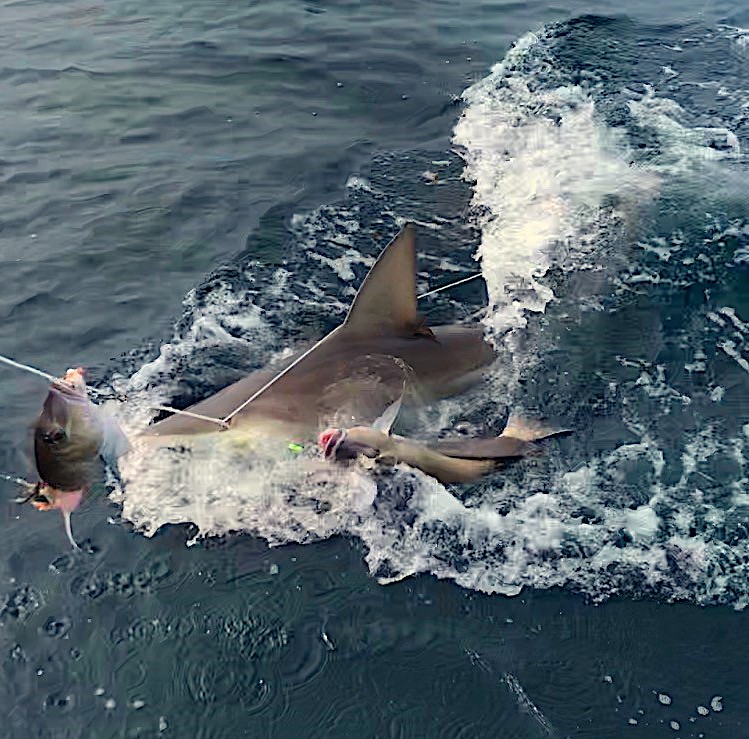Sea Grant Research Could Help Commercial Fishers Keep Sharks off Gear

FOR IMMEDIATE RELEASE
Contact: Katie Mosher, 919-515-9069, kmosher@ncsu.edu
North Carolina Sea Grant is collaborating on a new project to keep sharks away from commercial fishing gear. A team from NC State University, the Virginia Institute of Marine Science, and Indiana University-South Bend are partnering with the private sector to pilot test a device that deters the predators.
“Several sharks are overfished or are experiencing overfishing on the U.S. East Coast,” says Sara Mirabilio, a fisheries extension specialist with North Carolina Sea Grant, a statewide program based at NC State University. “Populations of scalloped hammerhead, dusky, sandbar and blacknose sharks all could benefit from an effective deterrent from commercial fishing gear.” Most often, sharks are caught unintentionally in a fishery that is targeting other fish, she explains. This is referred to as bycatch.
The project is one of three announced today by the National Sea Grant College Program to better understand highly migratory species, such as sharks, along the Atlantic and Gulf coasts.
Mirabilio and colleagues, including Richard Brill at the Virginia Institute of Marine Science and Peter Bushnell at Indiana University-South Bend, are testing a state-of-the-art electronic device that could help conserve species of sharks whose populations fishery managers are trying to rebuild. Unlike other fish, sharks possess an electrosensory system that equips them to detect close-range movements of predators or prey.
“The objective of the project is to keep the sharks away from the fishing gear, not the fishing gear away from the sharks,” says Brill. “To an approaching shark, even a weak electrical impulse can be disorientating or physically painful.” The device will produce a small electric field around a baited hook.
According to Mirabilio, industry experts believe reducing shark-gear interactions also will bring savings to commercial fishing operations.
“Sharks eat the fishing boat’s intended catch before it can be brought aboard,” explains the commercial fishing industry partner, Capt. Charlie Locke, owner of the F/V Salvation. “Also, when sharks are going for the tuna or other fish, they often damage, or even destroy, fishing gear.” Locke adds that sharks can increase the amount of time it takes to retrieve gear, as well as the time to sort the catch on-deck.
Mirabilio says it’s no surprise that earlier surveys have shown that commercial longline fishers are motivated to use such a device. “Beyond the economics, keeping sharks away all together is more acceptable to industry than time-area closures, mandatory release, and the use of specific hook types or longline-gear configuration.”
Brill touts the team’s device as small, waterproof, and programmable. “Our prototype differs from other devices, such as magnets and electropositive metals, that have produced mixed results,” he says.
Mirabilio says their approach has shown promise in the laboratory but still needs confirmation through field trials. The team is partnering on the project with Ocean Guardian, the company that pioneered “Shark Shield®” technology, to manufacture the first field-ready prototype. The company promotes electronic shark deterrent technologies as a safe, effective and humane solution.
Virginia’s Eastern Shore will mark the site of initial testing of a field-ready prototype. Then, the team will work with Locke to refine and deploy the device on a commercial longline off the Outer Banks of North Carolina.
“NOAA has made reducing shark bycatch a management priority,” says Mirabilio. “Positive results from our project would demonstrate that this device could help reduce shark bycatch nationally — and globally.”
News coverage of Brill and Bushnell’s earlier research with the electrosensory bycatch reduction device:
https://www.usnews.com/news/best-states/virginia/articles/2019-08-03/scientists-are-trying-to-keep-sharks-from-commercial-lines
About the other 2019 Sea Grant Highly Migratory Species Research Initiative projects:
https://seagrant.noaa.gov/News/Article/ArtMID/1660/ArticleID/2757/Sea-Grant-Awards-2-Million-in-Research-to-Improve-Understanding-Management-of-Highly-Migratory-Species
More information on Atlantic highly migratory species:
https://www.fisheries.noaa.gov/topic/atlantic-highly-migratory-species
More on sustainable fisheries and aquaculture:
https://ncseagrant.ncsu.edu/program-areas/fisheries-aquaculture/
What about recreational fishing research and news?
HookLineScience.com


